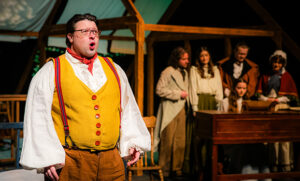It seems strange to me that audiences are so delighted in being brought to the brink of confusion while reading thriller novels like those of Dan Brown, watching films such as Flightplan or television shows like Lost, but that when a play in the theatre veers off in a similar direction audiences express an unusual sense of surprise and, it seems, a little more hesitance to blindly accept the same conventions that they have come to expect from other artistic mediums. Albertan playwright Stephen Massicotte’s play The Clockmaker, the opening production of Tarragon Theatre’s 40th season, is a riveting story that manages to suck the audience into a mystery, twist their expectations and offers a beautifully artful vision of how we choose to spend the brief time we are allotted on Earth, and how this changes once our time stops.
christian goutsis and claire calnan
photo cylla von tiedemann
The Clockmaker tells the story of Herr Mann, Heinrich, a reclusive, nervous, lowly repairer of watches, who inherited his father’s clock making shop but who has resigned himself recently to only just winding watches. When he is visited by Frieda, a woman with an irrevocably smashed clock, Heinrich discovers that she and her marriage to a raging abusive husband are just as broken, and he reveals to her his secret ambition to become the greatest clockmaker of all time. Simultaneously, at another point in time, Heinrich is being interrogated by the bureaucratic Monsieur Pierre about crimes that he is suspected of being about to commit, such as adultery and murder, and Heinrich and Frieda meet one another on a rainy day, she with a loaf of bread, taking shelter under a large tree. They have no memory of having met one another before, Frieda does not remember her husband and Heinrich has no knowledge of the plan they had concocted to save her from him. These two storylines continually intersect with one another and finally merge beautifully in an entirely satisfying revelation at the end.
Massicotte is a beautiful writer, especially in that the collaboration between the way his dialogue captures perfectly the state of mind of his characters and the way the four actors infuse their words with so much personality is utterly seamless. Massicotte has also captured a real poetic beauty in this mysterious tale and has woven much tenderness into the relationship between Heinrich and Frieda, a tenderness that is complicated by all the extenuating circumstances outside of their blissful respite under the tree in the rain with the loaf of bread.
Bob White directs the piece with a great sense of pacing, knowing exactly how to create a sense of tension and yet always offering enough clarity to keep the audience engaged in the action as it unfolds, never alienating them too much or allowing the play to move up too far up from the heart as to get lost in the head. White also makes good use of the humour in the play, which is always delightful. There is some particularly strong fight choreography from John Stead especially at the end of the play, although there was one moment between Frieda and Adolphus earlier on where my sight lines ruined the illusion. Scott Reid’s set design is magically versatile.
Kevin Bundy plays Adolphus with a fierce, volatile, brute strength that I have never seen him exhibit onstage before. What makes Bundy so terrifying is how unhinged his Adolphus is and how he can express sincere remorse, he can justify his behaviour and ask to be forgiven like a seven year old who has just broken a vase with a baseball, but he is unable to control his raging urges to beat his wife into submission. Claire Calnan gives a lovely performance as Frieda, a woman whose emotions are all over the place and finds herself lashing out at the one person she feels safe with, but she also shows courage and always a quiet dignity with her husband and a hope that she can one day metaphorically tame her lion and return to the happier days when they used to visit the circus and sit kissing in the moonlight. Damien Atkins is stoic as Monsieur Pierre and takes great command in capturing a brilliant collision between Franz Kafka and Lewis Carroll. Christian Goutsis is magnificent as the twitchy, nervous, insecure little clockmaker with a generous heart, tucked up carefully under his coat. Goutsis gives Heinrich a Chaplinesque sense of awe about the world, as though he were the type of person who walks around the city perpetually looking upward, feeling quite lowly and insignificant amid the splendour of everything else. There is a moment with Frieda, where he reveals one particular aspect of his innocence, which is just written plainly across Goutsis’ face, and it makes for a poignant and heartbreaking moment.
The Clockmaker is a lovely play, one that winds you up in wonder until the end and then propels you to reflect on how your time is made right now, and how you might choose to spend eternity.
The Clockmaker plays at the Tarragon Mainspace (30 Bridgman Avenue) until October 24th, 2010. For more information or to book your tickets please call 416.531.1827 or visit this website www.tarragontheatre.com.







